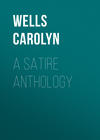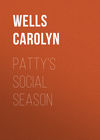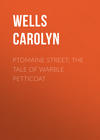Kitabı oku: «A Satire Anthology», sayfa 6
Yazı tipi:
CHRISTMAS OUT OF TOWN
FOR many a winter in Billiter Lane,
My wife, Mrs. Brown, was not heard to complain;
At Christmas the family met there to dine
On beef and plum-pudding, and turkey and chine.
Our bark has now taken a contrary heel;
My wife has found out that the sea is genteel.
To Brighton we duly go scampering down,
For nobody now spends his Christmas in town.
Our register-stoves, and our crimson-baized doors,
Our weather-proof walls, and our carpeted floors,
Our casements well fitted to stem the north wind,
Our arm-chair and sofa, are all left behind.
We lodge on the Steyne, in a bow-window’d box,
That beckons up-stairs every Zephyr that knocks;
The sun hides his head, and the elements frown,
But nobody now spends his Christmas in town.
In Billiter Lane, at this mirth-moving time,
The lamp-lighter brought us his annual rhyme;
The tricks of Grimaldi were sure to be seen;
We carved a twelfth-cake, and we drew king and queen.
These pastimes gave oil to Time’s round-about wheel,
Before we began to be growing genteel;
’Twas all very well for a cockney or clown,
But nobody now spends his Christmas in town.
At Brighton I’m stuck up in Donaldson’s shop,
Or walk upon bricks till I’m ready to drop;
Throw stones at an anchor, look out for a skiff,
Or view the Chain-pier from the top of the cliff:
Till winds from all quarters oblige me to halt,
With an eye full of sand and a mouth full of salt,
Yet still I am suffering with folks of renown,
For nobody now spends his Christmas in town.
In gallop the winds at the full of the moon,
And puff up the carpet like Sadler’s balloon;
My drawing-room rug is besprinkled with soot,
And there is not a lock in the house that will shut.
At Mahomet’s steam-bath I lean on my cane,
And murmur in secret, “Oh, Billiter Lane!”
But would not express what I think for a crown,
For nobody now spends his Christmas in town.
The Duke and the Earl are no cronies of mine;
His Majesty never invites me to dine;
The Marquis won’t speak when we meet on the pier,
Which makes me suspect that I’m nobody here.
If that be the case, why, then welcome again
Twelfth-cake and snap-dragon in Billiter Lane.
Next winter I’ll prove to my dear Mrs. Brown
That Nobody now spends his Christmas in town.
James Smith.
ETERNAL LONDON
AND is there, then, no earthly place
Where we can rest in dream Elysian,
Without some cursed round English face
Popping up near to break the vision?
’Mid northern lakes, ’mid southern vines,
Unholy cits we’re doomed to meet;
Nor highest Alps, nor Apennines,
Are sacred from Threadneedle Street.
If up the Simplon’s path we wind,
Fancying we leave this world behind,
Such pleasant sounds salute one’s ear
As, “Baddish news from ’Change, my dear:
The Funds (phew! curse this ugly hill!)
Are lowering fast (what! higher still?)
And (zooks! we’re mounting up to heaven!)
Will soon be down to sixty-seven.”
Go where we may, rest where we will,
Eternal London haunts us still.
The trash of Almack’s or Fleet-Ditch —
And scarce a pin’s-head difference which —
Mixes, though even to Greece we run,
With every rill from Helicon.
And if this rage for travelling lasts,
If cockneys of all sets and castes,
Old maidens, aldermen, and squires,
Will leave their puddings and coal fires,
To gape at things in foreign lands
No soul among them understands;
If Blues desert their coteries,
To show off ’mong the Wahabees;
If neither sex nor age controls,
Nor fear of Mamelukes forbids
Young ladies, with pink parasols,
To glide among the Pyramids:
Why, then, farewell all hope to find
A spot that’s free from London-kind!
Who knows, if to the West we roam,
But we may find some Blue “at home”
Among the Blacks of Carolina,
Or, flying to the eastward, see,
Some Mrs. Hopkins taking tea
And toast upon the Wall of China?
Thomas Moore.
THE MODERN PUFFING SYSTEM
UNLIKE those feeble gales of praise
Which critics blew in former days,
Our modern puffs are of a kind
That truly, really “raise the wind”;
And since they’ve fairly set in blowing,
We find them the best trade-winds going.
What storm is on the deep – and more
Is the great power of Puff on shore,
Which jumps to glory’s future tenses
Before the present even commences,
And makes “immortal” and “divine” of us,
Before the world has read one line of us.
In old times, when the god of song
Drew his own two-horse team along,
Carrying inside a bard or two
Booked for posterity “all through,”
Their luggage a few close-packed rhymes
(Like yours, my friend, for after-times),
So slow the pull to Fame’s abode
That folks oft slumbered on the road;
And Homer’s self sometimes, they say,
Took to his nightcap on the way.
But now, how different is the story
With our new galloping sons of glory,
Who, scorning all such slack and slow time,
Dash to posterity in no time!
Raise but one general blast of puff
To start your author – that’s enough:
In vain the critics sit to watch him,
Try at the starting-post to catch him;
He’s off – the puffers carry it hollow —
The critics, if they please, may follow;
Ere they’ve laid down their first positions,
He’s fairly blown through six editions!
In vain doth Edinburgh dispense
Her blue and yellow pestilence
(That plague so awful in my time
To young and touchy sons of rhyme);
The Quarterly, at three months’ date,
To catch the Unread One comes too late;
And nonsense, littered in a hurry,
Becomes “immortal” spite of Murray.
Thomas Moore.
LYING
I do confess, in many a sigh,
My lips have breath’d you many a lie,
And who, with such delights in view,
Would lose them for a lie or two?
Nay – look not thus, with brow reproving:
Lies are, my dear, the soul of loving!
If half we tell the girls were true,
If half we swear to think and do,
Were aught but lying’s bright illusion,
The world would be in strange confusion!
If ladies’ eyes were, every one,
As lovers swear, a radiant sun,
Astronomy should leave the skies,
To learn her lore in ladies’ eyes!
Oh no! – believe me, lovely girl,
When nature turns your teeth to pearl,
Your neck to snow, your eyes to fire,
Your yellow locks to golden wire,
Then, only then, can heaven decree,
That you should live for only me,
Or I for you, as night and morn,
We’ve swearing kiss’d, and kissing sworn.
And now, my gentle hints to clear,
For once, I’ll tell you truth, my dear!
Whenever you may chance to meet
A loving youth, whose love is sweet,
Long as you’re false and he believes you,
Long as you trust and he deceives you,
So long the blissful bond endures;
And while he lies, his heart is yours.
But, oh! you’ve wholly lost the youth
The instant that he tells you truth!
Thomas Moore.
THE KING OF YVETOT 1
THERE was a king of Yvetot,
Of whom renown hath little said,
Who let all thoughts of glory go,
And dawdled half his days abed;
And every night, as night came round,
By Jenny with a nightcap crowned,
Slept very sound:
Sing ho, ho, ho! and he, he, he!
That’s the kind of king for me.
And every day it came to pass
That four lusty meals made he;
And step by step, upon an ass,
Rode abroad, his realms to see;
And wherever he did stir,
What think you was his escort, sir?
Why, an old cur.
Sing ho, ho, ho! and he, he, he!
That’s the kind of king for me.
If e’er he went into excess,
’Twas from a somewhat lively thirst;
But he who would his subjects bless,
Odd’s fish! must wet his whistle first;
And so, from every cask they got,
Our king did to himself allot
At least a pot.
Sing ho, ho, ho! and he, he, he!
That’s the kind of king for me.
To all the ladies of the land
A courteous king, and kind, was he;
The reason why, you’ll understand —
They named him Pater Patriæ.
Each year he called his fighting men,
And marched a league from home, and then.
Marched back again.
Sing ho, ho, ho! and he, he, he!
That’s the kind of king for me.
Neither by force nor false pretence,
He sought to make his kingdom great,
And made (O princes, learn from hence)
“Live and let live” his rule of state.
’Twas only when he came to die,
That his people who stood by
Were known to cry.
Sing ho, ho, ho! and he, he, he!
That’s the kind of king for me.
The portrait of this best of kings
Is extant still, upon a sign
That on a village tavern swings,
Famed in the country for good wine.
The people in their Sunday trim,
Filling their glasses to the brim,
Look up to him,
Singing, “Ha, ha, ha!” and “He, he, he!
That’s the sort of king for me.”
Pierre Jean De Béranger.
SYMPATHY
A KNIGHT and a lady once met in a grove,
While each was in quest of a fugitive love.
A river ran mournfully murmuring by,
And they wept in its waters for sympathy.
“Oh, never was knight such a sorrow that bore!”
“Oh, never was maid so deserted before!”
“From life and its woes let us instantly fly,
And jump in together for company!”
They search’d for an eddy that suited the deed,
But here was a bramble, and there was a weed.
“How tiresome it is!” said the fair, with a sigh;
So they sat down to rest them in company.
They gazed at each other, the maid and the knight;
How fair was her form, and how goodly his height!
“One mournful embrace,” sobb’d the youth, “ere we die!”
So kissing and crying kept company.
“Oh, had I but loved such an angel as you!”
“Oh, had but my swain been a quarter as true!”
“To miss such perfection, how blinded was I!”
Sure now they were excellent company.
At length spoke the lass, ’twixt a smile and a tear,
“The weather is cold for a watery bier;
When summer returns we may easily die,
Till then let us sorrow in company.”
Reginald Heber.
A MODEST WIT
A SUPERCILIOUS nabob of the East —
Haughty, being great – purse-proud, being rich —
A governor, or general, at the least,
I have forgotten which —
Had in his family a humble youth,
Who went from England in his patron’s suite,
An unassuming boy, in truth
A lad of decent parts, and good repute.
This youth had sense and spirit;
But yet with all his sense,
Excessive diffidence
Obscured his merit.
One day, at table, flushed with pride and wine,
His honour, proudly free, severely merry,
Conceived it would be vastly fine
To crack a joke upon his secretary.
“Young man,” he said, “by what art, craft, or trade
Did your good father gain a livelihood?”
“He was a saddler, sir,” Modestus said,
“And in his time was reckoned good.”
“A saddler, eh? and taught you Greek,
Instead of teaching you to sew!
Pray, why did not your father make
A saddler, sir, of you?”
Each parasite, then, as in duty bound,
The joke applauded, and the laugh went round.
At length Modestus, bowing low,
Said (craving pardon, if too free he made),
“Sir, by your leave, I fain would know
Your father’s trade!”
“My father’s trade! by Heaven, that’s too bad!
My father’s trade? Why, blockhead, are you mad?
My father, sir, did never stoop so low —
He was a gentleman, I’d have you know.”
“Excuse the liberty I take,”
Modestus said, with archness on his brow,
“Pray, why did not your father make
A gentleman of you?”
Selleck Osborn.
THE PHILOSOPHER’S SCALES
A MONK, when his rites sacerdotal were o’er,
In the depth of his cell with its stone-covered floor,
Resigning to thought his chimerical brain,
Once formed the contrivance we now shall explain;
But whether by magic’s or alchemy’s powers
We know not; indeed, ’tis no business of ours.
Perhaps it was only by patience and care,
At last, that he brought his invention to bear.
In youth ’twas projected, but years stole away,
And ere ’twas complete he was wrinkled and gray;
But success is secure, unless energy fails,
And at length he produced The Philosopher’s Scales.
“What were they?” you ask. You shall presently see.
These scales were not made to weigh sugar and tea.
Oh, no; for such properties wondrous had they,
That qualities, feelings, and thoughts they could weigh,
Together with articles small or immense,
From mountains or planets to atoms of sense.
Naught was there so bulky but there it would lay,
And naught so ethereal but there it would stay,
And naught so reluctant but in it must go:
All which some examples more clearly will show.
The first thing he weighed was the head of Voltaire,
Which retained all the wit that had ever been there.
As a weight, he threw in a torn scrap of a leaf
Containing the prayer of the penitent thief;
When the skull rose aloft with so sudden a spell,
That it bounced like a ball on the roof of the cell.
One time he put in Alexander the Great,
With the garment that Dorcas had made, for a weight;
And though clad in armour from sandals to crown,
The hero rose up, and the garment went down.
A long row of almshouses, amply endowed
By a well-esteemed Pharisee, busy and proud,
Next loaded one scale; while the other was pressed
By those mites the poor widow dropped into the chest:
Up flew the endowment, not weighing an ounce.
And down, down the farthing-worth came with a bounce.
By further experiments (no matter how)
He found that ten chariots weighed less than one plough;
A sword with gilt trapping rose up in the scale,
Though balanced by only a ten penny nail;
A shield and a helmet, a buckler and spear,
Weighed less than a widow’s uncrystallized tear.
A lord and a lady went up at full sail,
When a bee chanced to light on the opposite scale;
Ten doctors, ten lawyers, two courtiers, one earl,
Ten counsellors’ wigs, full of powder and curl,
All heaped in one balance and swinging from thence,
Weighed less than a few grains of candor and sense;
A first-water diamond, with brilliants begirt,
Than one good potato just washed from the dirt;
Yet not mountains of silver and gold could suffice
One pearl to outweigh – ’twas The Pearl of Great Price.
Last of all, the whole world was bowled in at the grate,
With the soul of a beggar to serve for a weight,
When the former sprang up with so strong a rebuff
That it made a vast rent and escaped at the roof!
When balanced in air, it ascended on high,
And sailed up aloft, a balloon in the sky;
While the scale with the soul in’t so mightily fell,
That it jerked the philosopher out of his cell.
Jane Taylor.
FROM “THE FEAST OF THE POETS”
NEXT came Walter Scott, with a fine, weighty face,
For as soon as his visage was seen in the place,
The diners and barmaids all crowded to know him,
And thank him with smiles for that sweet, pretty poem!
However, he scarcely had got through the door,
When he looked adoration, and bowed to the floor,
For his host was a god – what a very great thing!
And what was still greater in his eyes – a king!
Apollo smiled shrewdly, and bade him sit down,
With, “Well, Mr. Scott, you have managed the town;
Now, pray, copy less – have a little temerity;
Try if you can’t also manage posterity.
All you add now only lessens your credit;
And how could you think, too, of taking to edit?
A great deal’s endured where there’s measure and rhyme,
But prose such as yours is a pure waste of time —
A singer of ballads unstrung by a cough,
Who fairly talks on, till his hearers walk off.
Be original, man; study more, scribble less,
Nor mistake present favor for lasting success;
And remember, if laurels are what you would find,
The crown of all triumph is freedom of mind.”
James Henry Leigh Hunt.
RICH AND POOR; OR, SAINT AND SINNER
THE poor man’s sins are glaring;
In the face of ghostly warning,
He is caught in the fact
Of an overt act —
Buying greens on Sunday morning.
The rich man’s sins are hidden
In the pomp of wealth and station;
And escape the sight
Of the children of light,
Who are wise in their generation.
The rich man has a kitchen,
And cooks to dress his dinner;
The poor, who would roast,
To the baker’s must post,
And thus becomes a sinner.
The rich man has a cellar,
And a ready butler by him;
The poor must steer
For his pint of beer,
Where the saint can’t choose but spy him.
The rich man’s painted windows
Hide the concerts of the quality;
The poor can but share
A crack’d fiddle in the air,
Which offends all sound morality.
The rich man is invisible
In the crowd of his gay society;
But the poor man’s delight
Is a sore in the sight,
And a stench in the nose of piety.
Thomas L. Peacock.
MR. BARNEY MAGUIRE’S ACCOUNT OF THE CORONATION
OCH! the Coronation! what celebration
For emulation can with it compare?
When to Westminster the Royal Spinster
And the Duke of Leinster, all in order did repair!
’Twas there you’d see the new Polishemen
Make a scrimmage at half after four;
And the Lords and Ladies, and the Miss O’Gradys,
All standing round before the Abbey door.
Their pillows scorning, that selfsame morning
Themselves adorning, all by the candle-light,
With roses and lilies, and daffy-down-dillies,
And gould and jewels, and rich di’monds bright.
And then approaches five hundred coaches,
With Gineral Dullbeak. – Och! ’twas mighty fine
To see how aisy bould Corporal Casey,
With his sword drawn, prancing, made them kape the line.
Then the guns’ alarums, and the King of Arums,
All in his Garters and his Clarence shoes,
Opening the massy doors to the bould Ambassydors,
The Prince of Potboys, and great haythen Jews;
’Twould have made you crazy to see Esterhazy
All jools from his jasey to his di’mond boots;
With Alderman Harmer, and that swate charmer,
The famale heiress, Miss Anjä-ly Coutts.
And Wellington, walking with his swoord drawn, talking
To Hill and Hardinge, haroes of great fame;
And Sir De Lacy, and the Duke Dalmasey
(They call’d him Sowlt afore he changed his name),
Themselves presading, Lord Melbourne lading
The Queen, the darling, to her royal chair,
And that fine ould fellow, the Duke of Pell-Mello,
The Queen of Portingal’s Chargy-de-fair.
Then the noble Prussians, likewise the Russians,
In fine laced jackets with their goulden cuffs,
And the Bavarians, and the proud Hungarians,
And Everythingarians all in furs and muffs.
Then Misther Spaker, with Misther Pays the Quaker,
All in the gallery you might persave;
But Lord Brougham was missing, and gone a-fishing,
Ounly crass Lord Essex would not give him lave.
There was Baron Alten himself exalting,
And Prince Von Schwartzenburg, and many more;
Och! I’d be bother’d, and entirely smother’d,
To tell the half of ’em was to the fore;
With the swate Peeresses, in their crowns and dresses,
And Aldermanesses, and the Boord of Works;
But Mehemet Ali said, quite gintalely,
“I’d be proud to see the likes among the Turks!”
Then the Queen – Heaven bless her! – och! they did dress her
In her purple garments and her goulden crown,
Like Venus, or Hebe, or the Queen of Sheby,
With eight young ladies houlding up her gown.
Sure ’twas grand to see her, also for to he-ar
The big drums bating and the trumpets blow;
And Sir George Smart, oh! he played a consarto,
With his four-and-twenty fiddlers all on a row!
Then the Lord Archbishop held a goulden dish up
For to resave her bounty and great wealth,
Saying, “Plase your Glory, great Queen Vic-tory!
Ye’ll give the Clargy lave to dhrink your health!”
Then his Riverence, retrating, discoorsed the mating:
“Boys, here’s your Queen! deny it if you can!
And if any bould traitor, or infarior craythur,
Sneezes at that, I’d like to see the man!”
Then the Nobles kneeling, to the Pow’rs appealing —
“Heaven send your Majesty a glorious reign!”
And Sir Claudius Hunter, he did confront her,
All in his scarlet gown and goulden chain.
The great Lord May’r, too, sat in his chair, too,
But mighty sarious, looking fit to cry,
For the Earl of Surrey, all in his hurry,
Throwing the thirteens, hit him in his eye.
Then there was preaching, and good store of speeching,
With dukes and marquises on bended knee;
And they did splash her with raal Macasshur,
And the Queen said, “Ah! then thank ye all for me!”
Then the trumpets braying, and the organ playing,
And the swate trombones, with their silver tones;
But Lord Rolle was rolling – ’twas mighty consoling
To think his lordship did not break his bones!
Then the crames and custard, and the beef and mustard,
All on the tombstones like a poultherer’s shop;
With lobsters and white-bait, and other swatemeats,
And wine and nagus, and Imparial Pop!
There was cakes and apples in all the Chapels,
With fine polonies, and rich, mellow pears.
Och! the Count Von Strogonoff, sure he got prog enough,
The sly ould divil, undernathe the stairs.
Then the cannons thunder’d, and the people wonder’d,
Crying, “God save Victoria, our Royal Queen!”
Och! if myself should live to be a hundred,
Sure it’s the proudest day that I’ll have seen!
And now, I’ve ended, what I pretended,
This narration splendid in swate poe-thry,
Ye dear bewitcher, just hand the pitcher;
Faith, it’s mesilf that’s getting mighty dhry.
Richard Harris Barham.
FROM “THE DEVIL’S DRIVE.”
THE devil returned to hell by two,
And he stayed at home till five;
When he dined on some homicides done in ragoût,
And a rebel or so in an Irish stew,
And sausages made of a self-slain Jew —
And bethought himself what next to do,
“And,” quoth he, “I’ll take a drive.
I walked in the morning, I’ll ride to-night;
In darkness my children take most delight,
And I’ll see how my favorites thrive.
“And what shall I ride in?” quoth Lucifer then;
“If I followed my taste, indeed,
I should mount in a wagon of wounded men,
And smile to see them bleed.
But these will be furnished again and again,
And at present my purpose is speed,
To see my manor as much as I may,
And watch that no souls shall be poached away.
“I have a state coach at Carlton House,
A chariot in Seymour Place,
But they’re lent to two friends, who make me amends
By driving my favorite pace;
And they handle their reins with such a grace,
I have something for both at the end of the race.
“So now for the earth to take my chance.”
Then up to the earth sprung he,
And making a jump from Moscow to France,
He stepped across the sea,
And rested his hoof on a turnpike road,
No very great way from a bishop’s abode.
But first, as he flew, I forgot to say,
That he hovered a moment upon his way
To look upon Leipsic plain;
And so sweet to his eye was its sulphury glare,
And so soft to his ear was the cry of despair,
That he perched on a mountain of slain;
And he gazed with delight from its growing height,
Nor often on earth had he seen such a sight,
Nor his work done half as well:
For the field ran so red with the blood of the dead,
That it blushed like the waves of hell!
Then loudly and wildly and long laughed he:
“Methinks they have here little need of me!”
…
But the softest note that soothed his ear
Was the sound of a widow sighing;
And the sweetest sight was the icy tear,
Which horror froze in the blue eye clear
Of a maid by her lover lying,
As round her fell her long fair hair;
And she looked to heaven with that frenzied air,
Which seemed to ask if a God were there!
And, stretched by the wall of a ruined hut,
With its hollow cheeks, and eyes half shut,
A child of famine dying:
And the carnage begun, when resistance is done,
And the fall of the vainly flying!
Lord Byron.
1.Version of W. M. Thackeray.
Türler ve etiketler
Yaş sınırı:
12+Litres'teki yayın tarihi:
28 ekim 2017Hacim:
230 s. 1 illüstrasyonTelif hakkı:
Public Domain









